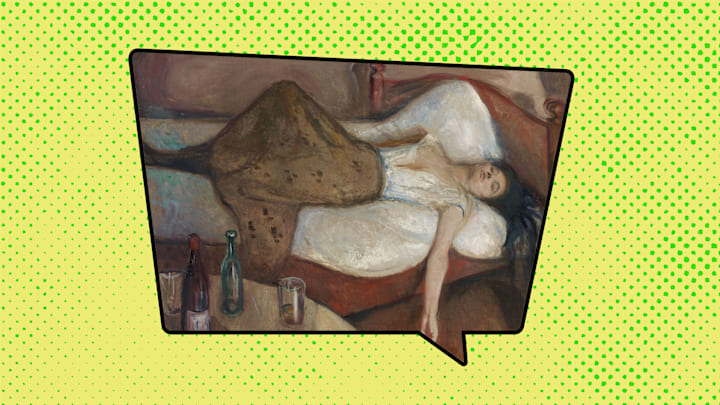It only takes one word to convey that you’re suffering the aftermath of overzealous imbibing: hungover. But it’s not the only word that people have ever used to describe such a state—and, frankly, some of history’s lost synonyms are a little more fun. From ale passion to vinnecky-vasky, here are 10 forgotten ways to say you’re hungover.
1. Ale Passion
Ale passion isn’t an enthusiasm for alcohol—it’s what comes after you exercise that enthusiasm. Passion used to mean “a painful disorder, ailment, or affliction,” per the Oxford English Dictionary. The phrase ale passion had fallen out of fashion by the 1600s, though not before it made an appearance in a 1593 account of how Bacchus supposedly celebrated Pentecost.
In it, a courtier named Gotfrey Grouthead shows up to the festivities with “a wallet full of woodcocks heads, the braines thereof tempered with other sauce” as “a passing preservative against the ale-passion or paine in the pate.” Marinated bird brains may not rank as a science-backed hangover cure, but they’re far from history’s grossest.
2. Chippy

The upbeat and cheerful chipper has an evil twin: chippy, a Victorian term to describe feeling hungover or unwell in general (often in the morning). It’s unclear exactly where it came from. Green’s Dictionary of Slang suggests that it’s an offshoot of cheap, which was also used to describe feeling ill (again, often in the morning). But the OED has its money on chip as the source word in the “broken fragment” sense.
3. Crapulous
Crapulous may seem like a tidy adjective for “feeling like crap,” but the two craps in question actually have different origins. Crapulous derives from the Latin crapula, meaning “drunkenness” or “hangover.” By the late Middle Ages, English speakers were using crapulous to describe “gross excess in drinking or eating,” per the OED, and by the mid-1700s that definition had broadened to include what too much booze can do to you—namely, make you feel like crap.
4. Crawsick
Crawsick is 18th-century Irish slang for hungover that remained popular well into the 20th century; James Joyce even mentioned it in Ulysses. Craw is another word for stomach, so the term technically refers to feeling sick to your stomach—but you can probably get away with using it for ale passion of any kind.
5. Like a boiled owl

Inebriated English speakers have been saying they’re “as drunk as an owl” at least since the mid-1600s. The origins of the expression are a mystery, but radio program A Way with Words once suggested that the link between owls and inebriation “may have to do with their glassy-eyed stare, the way they regurgitate undigested food, and the clumsy way they fly when startled.”
As far as we know, no owls were harmed in the transition from as drunk as an owl to as drunk as a boiled owl or as drunk as a stewed owl: The words boiled and stewed both just meant “drunk.” By the 1800s, people had started likening themselves to boiled or stewed owls whenever they felt exhausted, ill, or both—as is so often the case with hangovers.
6. Fishy about the gills
“You look fishy about the gills” is a very Victorian way to tell someone that it’s obvious they were out drinking the previous night. As James Redding Ware explained in his 1909 book Passing English of the Victorian Era, “Drink produces a pull-down of the corners of the mouth, and a consequent squareness of the lower cheeks or gills, suggesting the gill-shields in fishes.”
7. Hot coppers

Ever woken up after one too many with your mouth and throat positively burning with thirst? You’ve experienced hot coppers. The phrase, which first started appearing in print during the early 19th century, was apparently inspired by the big copper cooking (and laundry) pots known in the UK as coppers.
American writer George Ade mentioned the phenomenon in a song called “R-E-M-O-R-S-E” from the musical The Sultan of Sulu, which premiered on Broadway in late 1902. The character is lamenting the 23 cocktails he tossed back the night before:
“Last night at twelve I felt immense,
Today I feel like thirty cents.
My eyes are bleared, my coppers hot,
I’ll try to eat, but I cannot.”
Hot coppers and bleary eyes seem like a small price to pay for escaping death after downing nearly two dozen cocktails in a single night.
8. Katzenjammer
Katzenjammer, German for “cats’ wailing,” was a jaunty synonym for hangover from the mid-19th to the mid-20th century. It could also describe depression, an uproar, or any “unpleasant aftermath or reaction,” per the OED. But the best-known usage of katzenjammer comes from the comic strip Katzenjammer Kids, created by Rudolph Dirks in 1897 and carried on later by other artists. The titular kids, Fritz and Hans, weren’t hungover—they were just really naughty.
9. Monday head

The Monday after a party-heavy weekend is often characterized by a pounding headache and other symptoms of a vengeful hangover. Late 19th-century English speakers had a phrase for that: Monday head. Writer Wadham Peacock paid tribute to society’s collective malfunction on Mondays in a 1910 poem for The Sketch called “The Mondayish Feeling”:
“Laymen, going by rule of thumb,
Have known for ever so long
That Monday’s the day when everyone
And everything goes wrong.
But they’ve taken it all as a matter
of course,
Shrugged their shoulders, and said,
‘It’s that end-of-a-holiday,
After-a-jolly-day,
Old-fashioned Monday head.’”
10. Vinnecky-vasky
According to Green’s, vinnecky-vasky was a Victorian term for “suffering from and complaining of a hangover.” It only shows up once in the written record—in an 1850 slang dictionary by Edward Duncombe (or his brother John, depending on your source). But what vinnecky-vasky lacks in historical citations it more than makes up for by being fun to utter aloud.
